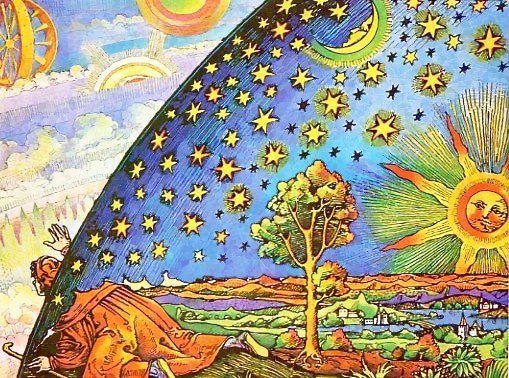Our thoughts genuinely change the way the world appears to us. Imagine yourself on a sunny day in a great mood. The people you meet smile and you notice how everyone seems helpful and hospitable, they reinforce your mood and everything just seems to flow easily. When, however, on that same sunny day, you are depressed and gloomy, the sun seems to give of a light that doesn't shine as bright, a light that isn't flattering. Does this mean that when we change our thoughts, we change our reality? Or do we change reality at large? In this post I want to dive a little deeper.

A Small Venture into Philosophy of Mind
One of the latests theories within the field of Philosophy of Mind and Computational Neuroscience states that our brain is a prediction error minimization machine. This basically means that on all levels of our brain, we tend to form competing theories (bottom up), which interfere with sensory input (top down), and we select the theory that closest resembles the input, to make valid predictions about what the world might be.
Now when we introduce time into the equation, memory becomes a factor. We remember the things we thought before and that were proven right by our perception. So we tend to choose the things we have chosen in the past. This means that we converge on choosing a 'local maximum': the prediction error is locally minimized, so any change will increase the prediction error and we stay with the theory that got us to a local maximum. But if it were possible to zoom out, we would see that there are many peaks and valleys and the prediction error might be minimized further by going through a valley up another peak. This is resistance to change. It is what makes us creatures of habbit.
It is our habbits that prevent us from changing our mind and seeing the world differently. The only way out of this, is by breaking patterns, either by training your attention and becoming aware of the habbits, thereby draining them of their power, or by being confronted with paradoxical information that our current habbits don't have an answer to. In this way, a change in paradigm can come about, which will help you to see reality in a new way.

Our Thoughts Matter
So far we have just looked at the matter from the inside out. However, this is only half the picture: we also have to assert how reality changes in response to our internal change. What really gets in the way is the still omnipresent Newtonian/Einsteinian view of reality as one and undivided. This is, perhaps, the biggest habbit of our mind: that reality itself cannot be changed. We are so stuck in this way to see reality, that it appears to us exactly in this way: as one and undivided, impossible to alter from changing our point of view. So any proof we see of the mechanism I'm about to describe, will be downplayed and taken as mere coincidence. It is the biggest box we choose to live inside.
Within Quantum Physics, particles are collapsing waveforms, which behave according to a probability distribution. What I want to propose is that what we see is that we have an infinite amount of parallel realities superimposed on one another and that it is our conscious attention choosing the one that most adheres to our conscious and unconscious thoughts and beliefs at that particular time. Seeing reality as one and undivided is merely one way of seeing reality, which is enveloped by the idea that many parallel realities exist at once.
So not only are the thoughts we have chosen by it adhering to reality, but complementarily, reality is chosen according to it adhering to our thoughts, both conscious and unconscious. It is our work to make the unconscious presuppositions conscious and change them if they do not serve our purpose anymore.
Panta Rhei
The Greek Sage/Shaman/Early Philosopher Heraclitus asserted that 'everything flows', with the famous idea that one cannot step into the same river twice (or once, according to some philosophers, because 'you' are part of the everchanging thing). Reality is like this, it is constantly changing, because we constantly move from one reality to another on the basis of the thoughts that we project into it. We are constantly changing because we are continuously part of a different reality. The process of becoming aware of our habbits, consciously breaking them, seeing how the universe responds and check if we like the results is the human journey.
Flow freely!
Upvoted :]